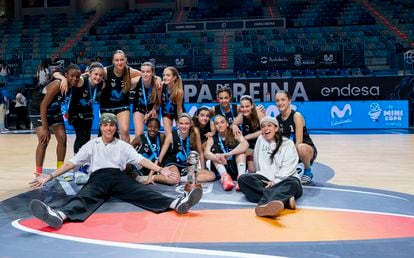There are hundreds of stories within a tournament. To know the champion is to tie only one end, one of the infinite threads that are interwoven to make up the tapestry. The 2024 edition of the Copa de la Reina basketball will be remembered as the first crown of Valencia Basket, the one of tears and the emotional support of all the fans gathered in Huelva for the center taronja Raquel Carrera, who suffered a serious knee injury that will prevent her from participating in the Paris Olympic Games with the National Team; that of the unpredictable joy of some 14-year-old girls, those of the Movistar Estudiantes, who against all odds and based on courage, beat Barça CBS and Spar Gran Canaria to take the cadet version of the trophy to Madrid, a women’s Mini Cup that celebrated their seventh edition.
And it will also be, and forever, the final in which the pop duo Marlena premiered during the break, before 4,000 people, the anthem they have composed for the Endesa Women’s League and for all of Spanish basketball: Wherever I go, is the name of the theme with which they sought to combine the values that, in their opinion, music and sport share. If you haven’t heard it yet, listen to it below.
A weekend with Marlena
Let’s return to this story, of all possible ones: join us to experience the Copa de la Reina from the inside with Ana Legazpi (vocalist) and Carolina Moyano (keyboardist and guitar) from Marlena.

It’s Saturday, it’s just after seven thirty in the afternoon. The final of the Endesa F Mini Cup 2024 is at stake. While the Madrid teenagers are struggling to hold on to a victory that the Canary Islands are fighting hard against, Marlena makes her appearance at the Carolina Marín, the Huelva pavilion that serves as the main venue of the tournament . They come from Seville, they gave a concert there the night before, and the thrilling euphoria still lasts in their bodies. “Who was going to tell me that one day she was going to be in a cup final!” Legazpi sighs that, as a child, she played basketball and loves the atmosphere that is generated around a basket. In another completely unexpected way, life has placed them there: in the center of the parquet, and they want to take advantage of the moment: “This is a sport in which it is not surprising to see a fan with a Silvia Domínguez shirt (base of the Salamanca player). Perfumerías Avenida) or a fan with Llull’s shirt (Real Madrid base),” says Moyano. Small gestures that, for them, denote that path towards equality that society takes step by step. “From music and sport and thanks to moments like this we can give it much greater visibility, give impetus to that change.”
Before the sound checks can begin, the exultant Estu players approach them, overcoming their shyness: they want them with them in the photo with which they will remember the victory. “Sure!”, they both answer in unison, and laugh while the girls show them the newly won trophy and end up, along with the team, lying on the floor. They are a reference for the younger generations. A responsibility that Marlena gladly assumes: “Having women to admire in basketball, music, soccer or in any discipline is the only way for the little ones to have models of diversity to look up to. In the end, it will be the children who reeducate and promote a change of perspective in their parents,” says Legazpi. She has the message so clear that one of the verses of Wherever I go He quotes it expressly: “We are going to be an example for those who come after us.”
The rehearsal lasts more than two hours, the cameramen adjust their movements to the singers’ choreography, the video clip of the anthem is projected on the video scoreboard. And, as always, unforeseen events arise and they even decide to change the repertoire: finally, they will perform their song Red Flagsand not Summer Love, the song with which they competed in the last Benidorm Fest as candidates for Eurovision. “For us, a sports career and a musical career have a lot in common, a series of lessons that are very valuable: teamwork, patience, looking for a new opportunity after each fall, perseverance, that effort alone that has of doing things every day to improve… It is the perfect symbiosis, music and sport.”

Sunday finally arrives, the day of the final. From a couple of hours before the initial whistle, before the sky is covered with the haze that will dye all the cars in Huelva the same ocher tone of dust, the fans of the two contenders, Valencia Basket and Casademont Zaragoza, congregate in around the Carolina Marín. Marlena arrives just beginning the first quarter, with the pavilion roaring to the sound of the hits of a bass drum. Ana Legazpi retires to warm up her voice; Carolina Moyano, meanwhile, cheers from the stands for the triples of Leti Romero (in the end, best player of the tournament) and the amazing penetrations of the Zaragoza guard Khayla Pointer.
There are less than five minutes until halftime. It’s your turn. Legazpi and Moyano go down the hallway and head towards the mouth through which they will jump onto the track.
“I’m tense,” Legazpi confesses, already with the microphone in her hand and her gaze lowered, concentrated.
But, at that moment, with forty seconds left in the second quarter, Marlena will discover that there is someone even more restless than them… A time-out is called on the court, the video scoreboard shows two of the volunteers from the cup organization, dressed in blue polo shirts: his name is Antonio Domínguez; she, Maria Kobylynska. When the camera points at them, Domínguez suddenly gets down on one knee: he asks her to marry him and Kobylynska’s glasses fog up with tears and she says yes. The stands jump with joy, an emotion that infects Legazpi and Moyano: their anthem, in addition to a hymn to the values of improvement in sport, has just become, by surprise, the soundtrack for the wedding of two newly engaged couples.
—Did you say yes? —they ask each other, and the confirmation of the good news makes them smile.
When they sing the chorus the entire pavilion chants it. There is no trace of the initial agitation, they are enjoying themselves, leaving their mark in the middle of the most anticipated women’s basketball game. When the music turns off, in the middle of the applause, Moyano grabs the microphone and shouts: “Long live sport, long live music and long live women.” “I hope what happened here today is repeated in other pavilions!” they will say, flooded with euphoria minutes later. “I hope the fans adapt it and use this music to sing songs of support for their players!”
Children who educate parents
After the performance, they distribute t-shirts, respond to the countless requests from girls and mothers and fathers who want to take photos with them or who stop them for a second to tell them that they have attended one of their concerts as a family. Legazpi stops to explain why he is so excited about this closeness. Again, the weight of setting an example: “It was also not easy for me to deal with my parents’ expectations, to talk to them and for them to understand that I liked to wear baggy pants and ‘boy’ t-shirts; Tell them that I wanted to change direction and dedicate myself to music, but we have to break the mold! ”he claims. Both Moyano and Legazpi are aware of what was found in the report sponsored by Endesa through the Basket Girlz project, which showed that the lack of support from the environment was one of the reasons why the majority of adolescent girls abandoned the practice prematurely. sports, unlike in the case of boys. “Rosalia herself says it and we have to listen to her: the study is compatible with sports, with music and with any other passion that one has,” says Marlena, with the impetus of someone who is truly convinced of wanting to end that scourge That’s why it exists Wherever I go.
This is how the anthem was created
Like all good stories, the beginning of this one had something of an inevitable encounter. It is told by Ignacio Asensi, director of Endesa Sponsorships and father of this initiative. During the U16 Women’s World Cup held in Madrid, Endesa invited the Spanish National Team to a Marlena concert. The players and the artists met and a first bond was generated: they love basketball and what it inspires. “After their performance at the premiere of the documentary that we had produced to try to stop the abandonment of sports practice among girls, we challenged them: ‘would you dare to compose an anthem to join this cause of women’s sports?’ After two weeks we had a model that we loved, and there was no choice but to ride this wave together.”



